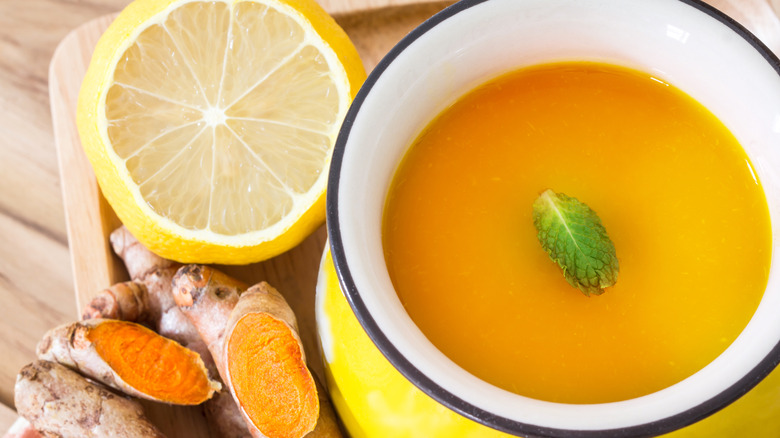Five Eye-Opening Ways To Reduce Inflammation
No matter where you've got it, inflammation is the pits. We always feel it when it pops up, but do we really know what it means? Inflammation can happen when we suffer an injury, come into contact with a virus, bacteria, or toxic chemical, or even when we eat something that doesn't agree with us. When these things happen, the Cleveland Clinic explains that our immune system sends out inflammatory cells and cytokines, a substance that will continue to stimulate those cells. Once they get to the area where the problem lies, our tiny first responders get to work, trapping bacteria and all the "bad stuff" before beginning the healing process.
Inflammation can be acute — if you twist your ankle, you might experience heat, pain, redness, or bruising. Chronic inflammation can also occur as a result of autoimmune disorders, exposure to toxins, or if acute inflammation is left untreated. Chronic inflammation can cause fatigue, skin rashes, joint soreness, fever, bloating, and abdominal pain. We know that whatever kind you've got can be really uncomfortable, so we've compiled a list of things you can do at home that will help ease inflammation whenever it arises.
Body work to treat inflammation
The first thing you should do when you feel inflammation in the body is examine your dinner plate. Dr. Kenneth Bock explained on the mindbodygreen podcast that figuring out your food sensitivities is key in addressing inflammation. The American Academy of Allergy, Asthma & Immunology notes that food sensitivities occur when a person has difficulty digesting a particular food, which can lead to intestinal gas, abdominal cramping, or diarrhea. Eliminating these foods gives the body a break from sending those inflammatory cells out to clean up the mess.
If you aren't sure what sensitivities you have, you can start by staying away from added sugars. According to MedicalNewsToday, sugar stimulates the liver to produce free fatty acids which, when digested by the body, can trigger inflammatory processes.
There are also supplements and herbs you can add to your diet that are adept in fighting the good fight against inflammation. Dr. Bock recommends a combination of vitamin D, probiotics, and fish oil. EcoWatch adds that turmeric, cloves, ginger, and cinnamon can do the trick. Sounds like a date with a warm mug of golden milk is in your future!
Soul work to address inflammation
Now that we've taken care of your body, let's check in with how your soul feels. A 2012 study published in the Proceedings of the National Academy of Sciences found that psychological stress can play a huge part in chronic inflammation, as inflammation is, in part, regulated by cortisol — the stress hormone. It was noted by the lead researcher that when cortisol is not able to serve its function, inflammation continues to build. When you feel stressed, take a walk, sit on the couch with a book, or lay in the grass at your favorite park for some relief.
While you're at, Dr. Bock suggests making plans with some friends. Love and laughter, he claims, really are the best medicine (per mindbodygreen). Laughter has been linked to increased stimulation of the vagus nerve, which supports the healthy regulation of emotions. When the vagus nerve is out of whack, inflammation usually follows, so laugh it up!



